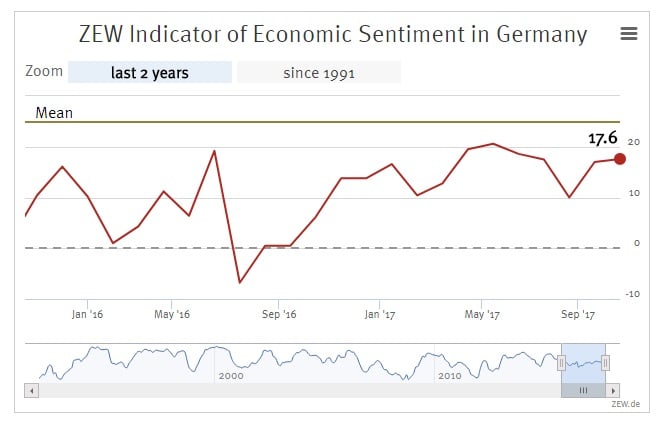German ZEW Points to Robust Growth for Europe's Largest Economy but Disappoints Against Expectations
- Written by: James Skinner

The outlook for German industry is brightening, albeit at a slower than expected pace, while prospects for Eurozone economic development have deteriorated.
German investor confidence rose by a fraction during October, according to the latest ZEW Economic Sentiment survey, although the rise was not as pronounced as many economists had hoped for.
Economists had forecast a rise to around the 20.1 level for October, up from the 17.0 threshold seen in September, but the index rose to just 17.6 for the period instead.
“The indicator currently stands at 17.6 points, which corresponds to an increase of 0.6 points compared with the September result. The indicator, however, still remains below the long-term average of 23.8 points,” says Achim Wambach, president of ZEW.
The ZEW survey polls 350 institutional investors in Germany for their view of current national and international economic conditions and their outlook for the six months ahead.
"The improved outlook for the coming six months is not least the result of the surprisingly positive growth figures seen in the previous months. In August, figures for both production and incoming orders were significantly better than expected,” says Wambach.

ZEW notes improved conditions for German exports as well as the broader economy, stemming from a firming economic recovery in Europe, which could have implications for European Central Bank monetary policy.
“The fact that the inflation rate is rising again, and expected to climb further, equally points towards a positive economic development in Germany, making a change in the ECB’s monetary policy more likely,” says Wambach.
The Euro extended earlier losses in response to the report, dropping further against the US Dollar, Swiss Franc and Japanese Yen. It pared losses against Sterling, much of which had occured in the half hour leading up to the ZEW release - a response to UK October inflation numbers.
The Pound-to-Euro rate was quoted 0.29% higher at 1.1268 shortly after the release while the Euro-to-Dollar rate was down 0.28% at 1.1761.

"It is encouraging that a majority of investors still expect conditions to improve despite the stronger likelihood that the ECB will taper its asset purchases next year and the fact that the euro exchange rate has remained at a fairly high level," says Jennifer McKeown, chief European economist at Capital Economics.
McKeown notes that the ZEW survey results only have a very loose relationship with German GDP so are not an ideal indicator of German growth. Nonetheless, the survey result points to economic growth of around 2% for the current year, which McKeown's own forecasts suggest is too pessimistic. McKeown and Capital Economics team see the German economy expanding by around 2.3% for the current year.
A fall in the value of the Euro, stronger stock markets and better industrial production data going back to September were all expected to help lift the ZEW index substantially during the current month. But the sustained upswing may have been hampered by political developments in Germany and elsewhere in Europe.
“The assessment of the current economic situation in Germany has slightly decreased, but is still at a very high level...The financial market experts’ sentiment concerning the economic development of the Eurozone has considerably decreased. The corresponding indicator has fallen by 5.0 points, to a reading of 26.7 points,” says Wambach.
German Chancellor Angela Merkel has spent much of the time between Tuesday’s ZEW report and the September survey attempting to put together a coalition to govern in the wake of September’s election, which saw her party garner the lowest share of the national vote since 1949.
In addition, developments in Spanish and Austrian politics have both been seen yielding outcomes that bode ill for the Eurozone integration story.
Catalonia’s push for independence from Spain not only prompts questions over the constitutional future of the Spanish state but also over the viability of efforts to see further powers transferred away from Euro zone nations and to the centre in Brussels.
Meanwhile, Sunday’s election in Austria showed a sharp swing in voter support toward parties who have opposed further integration and whose other policies create scope for differences between Austria and Brussels.



